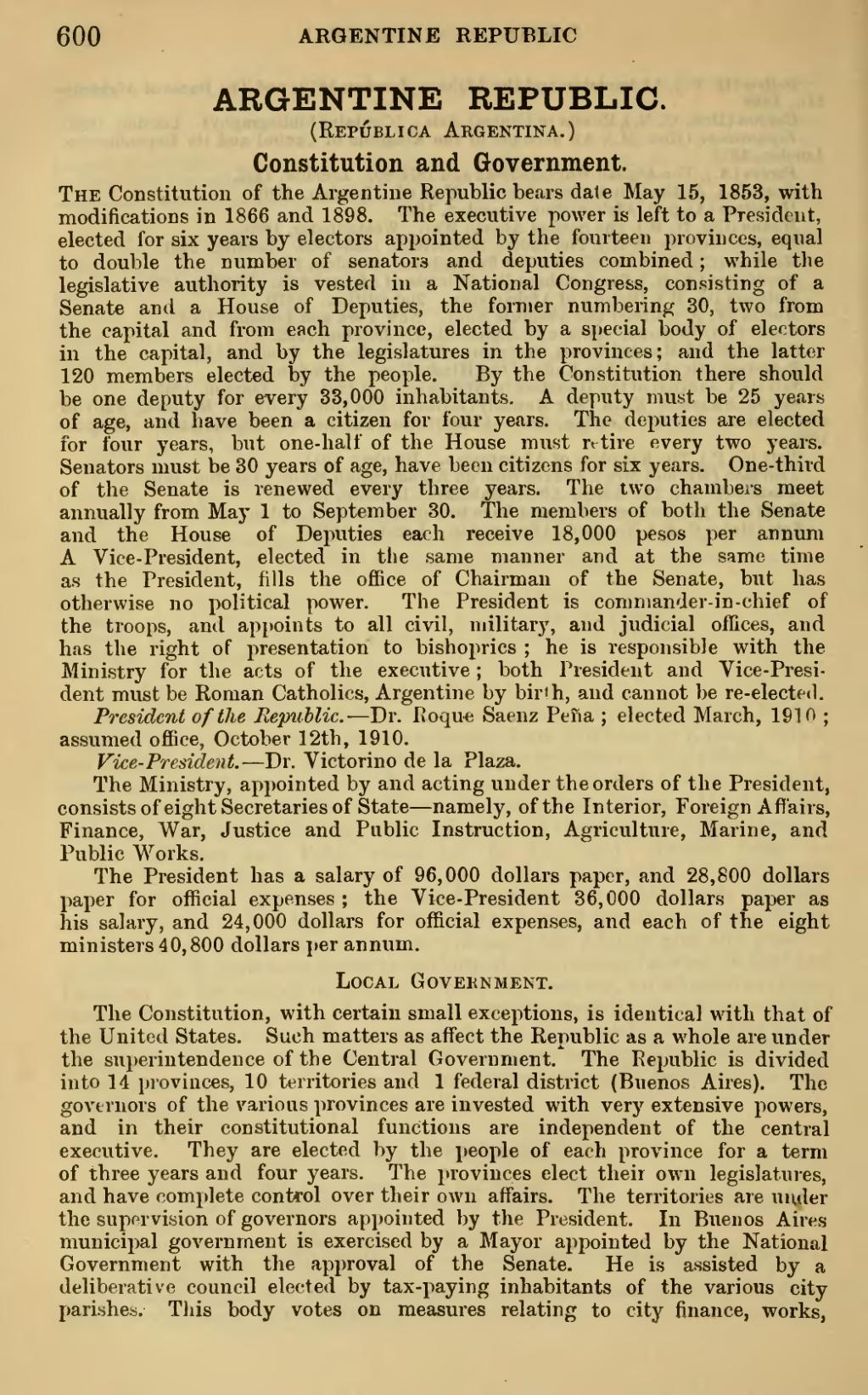600 ARGENTINE REPUBLIC
ARGENTINE REPUBLIC.
(Republica Argentusta.) Constitution and Government.
The Constitution of the Argentine Republic bears dale May 15, 1853, with modifications in 1866 and 1898. The executive power is left to a President, elected for six years by electors appointed by the fourteen provinces, equal to double the number of senators and deputies combined ; while the legislative authority is vested in a National Congress, consisting of a Senate and a House of Deputies, the former numbering 30, two from the capital and from each province, elected by a special body of electors in the capital, and by the legislatures in the provinces ; and the latter 120 members elected by the people. By the Constitution there should be one deputy for every 33,000 inhabitants. A deputy must be 25 years of age, and have been a citizen for four years. The deputies are elected for four years, but one-half of the House must retire every two years. Senators must be 30 years of age, have been citizens for six years. One-third of the Senate is renewed every three years. The two chambers meet annually from May 1 to September 30. The members of both the Senate and the House of Deputies each receive 18,000 pesos per annum A Vice-President, elected in the same manner and at the same time as the President, fills the ofiice of Chairman of the Senate, but has otherwise no political power. The President is commander-in-chief of the troops, and appoints to all civil, military, and judicial offices, and has the right of presentation to bishoprics ; he is responsible with the Ministry for the acts of the executive ; both President and Vice-Presi- dent must be Roman Catholics, Argentine by birth, and cannot be re-elected.
President of the Republic. — Dr. Roque Saenz Pena ; elected March, 1910 ; assumed office, October 12th, 1910.
Vice-President. — Dr. Victorino de la Plaza.
The Ministry, appointed by and acting under the orders of the President, consistsof eight Secretaries of State — namely, of the Interior, Foreign Afi'airs, Finance, War, Justice and Public Instruction, Agriculture, Marine, and Public Works.
The President has a salary of 96,000 dollars paper, and 28,800 dollars paper for official expenses ; the Vice-President 36,000 dollars paper as his salary, and 24,000 dollars for official expenses, and each of the eight ministers 40,800 dollars per annum.
Local Government.
The Constitution, with certain small exceptions, is identical with that of the United States. Such matters as affect the Republic as a whole are under the superintendence of the Central Government. The Republic is divided into 14 provinces, 10 territories and 1 federal district (Buenos Aires). The governors of the various provinces are invested with very extensive powers, and in their constitutional functions are independent of the central executive. They are elected by the people of each province for a term of three years and four years. The provinces elect their own legislatures, and have complete control over their own affairs. The territories are under the supervision of governors appointed by the President. In Buenos Aires municipal government is exercised by a Mayor aj^pointed by the National Government with the approval of the Senate. He is assisted by a deliberative council elected by tax-paying inhabitants of the various city parishes. This body votes on measures relating to city finance, works,
